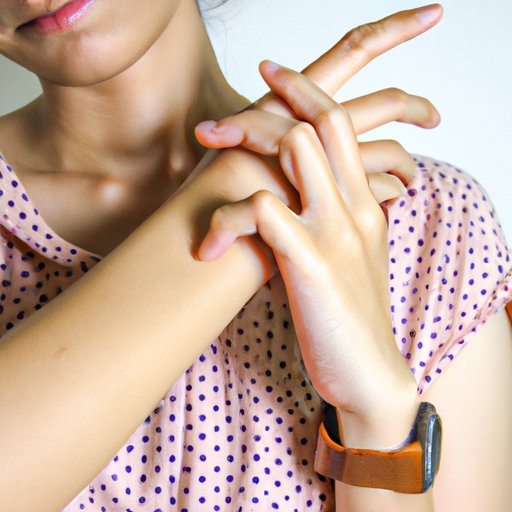Introduction
Itchiness is a common symptom that can range from mildly annoying to persistently uncomfortable. Itching is usually caused by dry skin or allergies, but can also be a sign of more serious conditions such as eczema or psoriasis. If you’re experiencing itchiness, it’s important to identify the underlying cause in order to find the best treatment.
Avoid Scratching the Itch
When faced with an itch, it can be tempting to give in to the urge to scratch. However, this can actually make the itching worse. According to Dr. Adam Friedman, MD, FAAD, Professor and Interim Chair of Dermatology at George Washington School of Medicine and Health Sciences, “Scratching can cause inflammation and irritation, leading to more intense itching and even infection.” To avoid scratching, try keeping your nails short and filing them down if necessary. You can also keep your hands busy with activities like playing with a fidget spinner or squeezing a stress ball. Additionally, applying cold compresses or ice packs to the affected area can provide temporary relief from the urge to scratch.
Take a Cool Shower or Bath
Taking a cool shower or bath can help reduce inflammation and provide relief from itching. A study in the Journal of the European Academy of Dermatology and Venereology found that bathing with lukewarm water was more effective than hot water at reducing itch intensity in people with atopic dermatitis. Additionally, adding colloidal oatmeal to your bath can help soothe irritated skin and reduce inflammation. After your shower or bath, gently pat your skin dry with a soft towel and apply a moisturizer to help keep your skin hydrated.
Apply an Anti-Itch Cream or Ointment
Anti-itch creams and ointments can provide temporary relief from itchiness. These products typically contain ingredients such as menthol, camphor, or hydrocortisone, which help soothe the skin and reduce inflammation. When using these products, make sure to follow the instructions on the packaging and avoid applying them to broken or irritated skin.
Wear Loose, Breathable Clothing
Wearing loose, breathable clothing can help keep your skin from becoming too hot and irritated. Materials like cotton are best, as they allow air to circulate and wick away moisture. Additionally, avoid wearing tight-fitting clothes and synthetic fabrics like polyester, which can trap heat and cause further irritation.

Try Taking an Oral Antihistamine
If your itching is caused by allergies, an oral antihistamine may provide relief. Antihistamines work by blocking the effects of histamine, a chemical released by the body during an allergic reaction that causes itching and other symptoms. Common over-the-counter antihistamines include loratadine (Claritin), cetirizine (Zyrtec), and diphenhydramine (Benadryl). Talk to your doctor before taking any new medications, as they can cause side effects such as drowsiness, dry mouth, and nausea.
Conclusion
Itching can be a persistent and uncomfortable problem. In order to find relief, it’s important to identify the underlying cause. While there is no one-size-fits-all solution, some helpful strategies include avoiding scratching, taking a cool shower or bath, applying an anti-itch cream or ointment, wearing loose, breathable clothing, and, if necessary, trying an oral antihistamine. If these strategies don’t provide relief, talk to your doctor about other potential treatments.
(Note: Is this article not meeting your expectations? Do you have knowledge or insights to share? Unlock new opportunities and expand your reach by joining our authors team. Click Registration to join us and share your expertise with our readers.)
